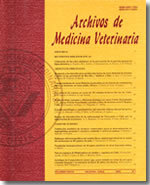Pharmacovigilance in veterinary medicine: an international perspective and the current situation in Chile
Main Article Content
Abstract
Pharmacovigilance is an activity that involves the detection and evaluation of adverse drug reactions. These are unintended and harmful reactions which occur at doses that are normally used in animals for the prophylaxis, diagnosis or treatment of diseases or the modification of physiological function. Pharmacovigilance programs for human and veterinary medicine have been established by the United States of America, the European Union, the United Kingdom and Australia, among others. These programs gather information on adverse reactions by spontaneous reporting systems. Regulatory agencies analyze the reports and adopt decisions as needed, such as the modifications of the technical specifications or the withdrawal of certain drugs of the market, as it has been done for human medicine. Since 1995, a human pharmacovigilance program has been established in Chile and is carried out by the Instituto de Salud Pública. On the contrary, safety and efficacy of veterinary medicines are only considered in the registration process under the responsibility of the Ministry of Agriculture (Servicio Agrícola y Ganadero). As a consequence, the frequency and severity of adverse reactions remains unknown. The importance of pharmacovigilance programs and the actions needed to fulfill their objectives are shown by the international experience. An analysis of the strengths and weaknesses of international pharmacovigilance systems and the current situation in Chile is presented.

